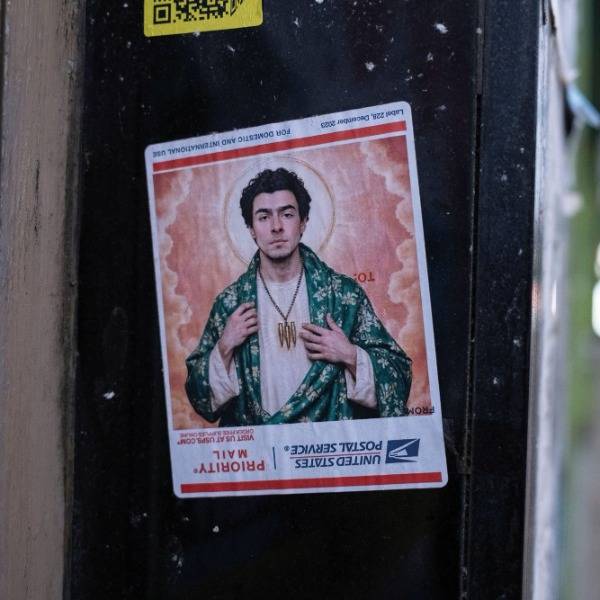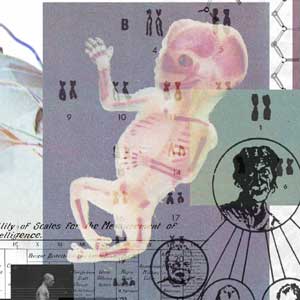The Rational Response Squad, which celebrates its first birthday this month, is the creation of three friends in their late 20s. Brian, Mike and Rook from Philadelphia were brought up in strongly Christian homes. Rook, the Catholic, was studying to be a priest by the time he was sixteen.
 As they matured each started to explore the assumptions which they had been brought up not to question, using the considerable research and debate potential of the internet. Brian Sapient (not his real name) explains: “We wanted to learn about this thing our parents had taught us, and gradually we each came to realise that our parents believed something that at best wasn’t provable and at worst suggests that our parents were very gullible indeed.” Like many teenagers Brian spent hours in internet chat rooms and discussion boards. The difference was that rather than discussing music and dating he was more concerned with exploring the logic – what he soon came to believe was the deep illogic – of religious belief.
As they matured each started to explore the assumptions which they had been brought up not to question, using the considerable research and debate potential of the internet. Brian Sapient (not his real name) explains: “We wanted to learn about this thing our parents had taught us, and gradually we each came to realise that our parents believed something that at best wasn’t provable and at worst suggests that our parents were very gullible indeed.” Like many teenagers Brian spent hours in internet chat rooms and discussion boards. The difference was that rather than discussing music and dating he was more concerned with exploring the logic – what he soon came to believe was the deep illogic – of religious belief.
“I was like, ‘wow’, this thing which is so powerful in our lives does not have the evidence or proof for it that other things we believe as a society have. It’s been given a free pass.” For Brian there was no explicit moment of revelation, or counter-revelation, just a slow accumulation of evidence, gathered during long nights in debate with religious believers online. “At first I was the guy on the message boards who wanted to dialogue. I always said, ‘Can’t we all just respect each other’s views?’ But gradually I realised that I wasn’t getting any respect back. We felt that religious people had been insisting that we respect their beliefs when they were not respecting ours. That people have their religious beliefs, that doesn’t bother me, they are free to believe what they want. What bothers me is when their beliefs infringe on my right to believe or cause harm to the community – if they could manage to keep their beliefs to themselves, fine. So I took a stand. I realised it was okay to be very open and even aggressive about saying I am an atheist.”
While so-called hard-line atheists come under frequent attack in Britain for being dismissive, rude or naïve about religion, Brian Sapient and his colleagues have a deep knowledge of religion and no scruples about stating the case against. They also have the evidence to justify their position: “Think of the damage that religion does – there’s the thwarting of science like stem cell research, there are George Bush’s religiously motivated wars, there’s the denial of sexuality which seems to produce priests who can’t keep their pee pees in their pants – as good an example of the church ignoring the facts of life as you could wish. Religion is just a never-ending barrage of illogic... Why do they believe this silly nonsense?”
In 2005 Brian and his friends took the next step, and created the kind of forum for atheism they could see was needed. “There are tons of atheist websites out there, but there was nothing bringing them together. There are the humanist organisations too, but there’s been a lot of infighting between the different groups. We wanted to cater to the crowd who wanted to speak up loud and bluntly, but we didn’t want to have to deal with the other groups, saying, ‘No you’re doing it wrong.’ We wanted to get right down to the basics, to debate with those who believe, on the basis of rationality.”
Central to their aims was to create a community, so the first thing they did was set up a website which holds discussion forums and registers members. Then came an internet radio show dedicated to non-belief. Brian had done work previously with the grand old man of internet atheism, Reginald Finley aka The Infidel Guy, who set up a network of irreligious radio broadcasts, freethoughtradio.com, running continuously, with parallel internet discussions boards. So Brian and his friends, broadcasting from the basement of his house in Philly, took their increasingly uncompromising brand of debunking (defined on their website as “Give us your nutters, your cranks, your theists yearning to be free, and we’ll do our best to oblige them in the spirit of freethought”) to the digital airwaves.
The ball started rolling. “Our success is all built on the networking we did through the website. People were coming from all over to sign up, and of course religious people would come to debate us which was fun. I think it’s true to say that we have the fastest growing atheist website on the internet – we’re getting somewhere between 25 and 30 new members a day. We’re even beating Dawkins.”
Next, in December 2006, came The Blasphemy Challenge, an inspired idea which makes use of another internet boom, this time in homemade video, through the Google-owned YouTube site. The challenge was to “declare your independence from the stone age” by recording a short film of yourself renouncing God, Jesus and the holy spirit, and posting it as a response on the YouTube website.
Within days it was clear that a phenomenon was building, with floods of thanks and testimonies from grateful young people. A typical anonymous contributor from Dry Ridge, Kentucky, felt rescued. The social life of his community and familiy, he explained, revolves around the local church – there are 12 in his town of just over two thousand people. His friends sing in the choir and have signed up to the evangelical abstinence pledge The Silver Ring Thing. Living in this solid middle-American, God-fearing community, he was afraid to tell anyone that he didn’t believe in God. He felt isolated and alone. But now, thanks to The Rational Response Squad, he feels like shouting his unbelief from the rooftops.
When responses reached the 500 mark the media started to take notice. An article in Newsweek led to four local media interviews and finally to a segment on the national flagship news programme Nightline. While that show did its best to challenge their certainty – “What’s wrong with God?” asks the earnest anchor. “Nothing, what’s wrong with the tooth fairy?” retorts the sanguine Sapient – and put up a brace of priests to suggest that what they were doing was a “rejection of hope”, the net result was a huge boost in membership for the squad.
Currently The Blasphemy Challenge is the second most responded to video on YouTube, with well over 1300 replies – a number that includes the 150 Christian rebuttals that Brian, in the spirit of debate, has let through.
The squad is still relatively small, but growing. Brian is the only full-time employee – the group is funded by donations through the website – and it’s still run from his basement, though he’s thinking of getting a building to house the various atheist operations. So far they have 10 affiliate squads – the Southern California chapter already has several hundred members – and it’s growing by the day.
The radio show is weekly with the slightly rambling folksy format of US talk radio, featuring a diverse range of content, from the regular “Christian Interventions”, when believers are invited on to state their case and then frequently confounded by a barrage of incompatible or illogical biblical quotes from a team well versed in theology, to interviews with prominent atheists like Brian Flemming (director of The God That Wasn’t There) or Luigi Cascioli, the Italian who sued the government for claiming Jesus was divine. Even Dawkins himself has appeared.
 They are diversifying. Having met many atheist musicians online – including the remarkable Greydon Square, a native of Compton, veteran of two tours to Iraq, currently studying physics at Arizona State, and possessed of genuine lyrical skills – Brian’s planning to put out a compilation of atheist hip hop later in the year.
They are diversifying. Having met many atheist musicians online – including the remarkable Greydon Square, a native of Compton, veteran of two tours to Iraq, currently studying physics at Arizona State, and possessed of genuine lyrical skills – Brian’s planning to put out a compilation of atheist hip hop later in the year.
And, if his nerve holds, 2007 will also see the launch of their “Recycle the Bible” campaign. “We’re going to go door to door and say that since the Bible is now available online shouldn’t people recycle their copies. We’re not trying to make it disappear – after all it’s an important tool; when we manage to end Christianity it will be useful to remind us how gullible people can be if they are brainwashed from an early age – but we would like to pulp a whole load of them and donate the profits from selling the recycled material to scientific research. They are also considering a “draw Muhammad” competition.
When I suggest that in a country which has very high proportions of hand-gun-owning believers this might be considered a mite foolhardy Brian responds that he feels compelled to do these things precisely because they are dangerous. The is a lot of emphasis in their work on the desire not to feel afraid: “Our freedom of thought is at stake.”
The Rational Response Squad may not be quite the thing for the high-minded European sceptic. But then it’s not for them. But for the guy who posted on their site to say “thanks”, but didn’t want to give his name because “I am forced to keep my beliefs on a low profile due to the fact that I work in choral music and have lost jobs because of sharing my beliefs,” or the isolated freethinking teenager in Dry Ridge, Kentucky, they might be just what is required. ■

